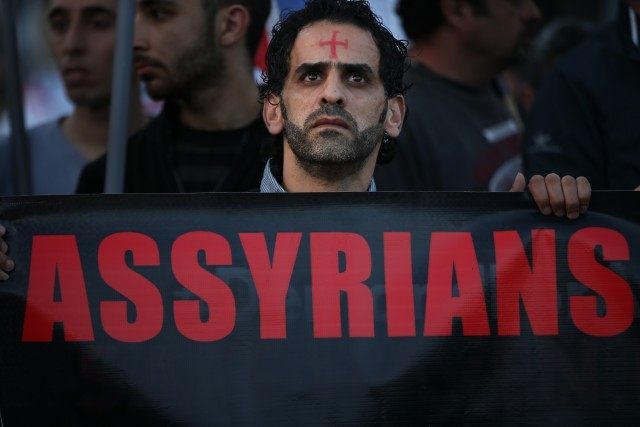Al-Monitor delivers one of the most sobering assessments of the bloody mess in Syria to date, as author Edward Dark returns to his hometown of Aleppo for a look at the plight of the dwindling Christian community, and finds them turning to dictator Bashar al-Assad for protection from the jihadis fighting to overthrow him.
The Syrian Christian community has always been an under-reported element of the civil war. Assad was inflicting gruesome horrors upon his citizens long before he uncorked his first tank of chemical weapons, taking him across a humanitarian “red line” that the world could not ignore, in part because that red line was meant as an excuse for ignoring atrocities the civilized world is not supposed to tolerate. Once the WMD forbidden zone was entered, it was no longer possible to overlook the lesser evils. The Syrian rebellion, on the other hand, began as the heroes in the Western world’s favored narrative of resistance against tyranny, only to be revealed as a jihadi jungle in which effective “moderate” forces that could be safely armed from the arsenal of democracy were hard to find. No one enjoys choosing sides in a conflict between villains and monsters.
Caught in the crossfire from Day One were Syria’s Christians, a minority Assad went to some lengths to protect. Dark interviewed a Christian community leader in Aleppo named Abu Fadi, and he was blunt about the situation his community faces: “There is no question at all about whom we support: the government, of course. It is the only force protecting us from the jihadists and extremists.”
Abu Fadi explained that resistance to the Assad regime was founded upon solid complaints at first, featuring protests against corruption and calls for reform, but the Christians soon concluded it was really about extremists seeking to take power for themselves, no matter how much damage they inflicted upon the country. “They soon showed their true faces, the religious extremism they were hiding. Anyone who took up arms against the state is wrong,” he declared.
He denied the notion that all the trouble is coming from foreign infiltrators such as al-Qaeda and ISIS, noting that local rebel units have also destroyed Christian homes and churches, and not just as collateral damage from shots fired at government forces. “They want to get rid of us, drive us from our lands that we have inhabited for centuries,” he asserted. “They have destroyed churches. Look at Kassab and Maaloula, do you need further proof?”
He’s referring to two towns where Syrian rebels drove out Christian populations. Kassab’s Armenian Christians say Turkish troops stood by and watched while Islamist rebels overran the town. Maaloula was reduced to rubble in the struggle between rebels who made a point of desecrating its historic churches, and Syrian government forces who presented their recapture of the city as evidence of Assad’s determination to protect religious minorities.
Unable to form their own effective militia units, as the Assyrian Christians have done, Aleppo’s Christians see enlisting with the Syrian military as their only option for self-defense. They appear acutely aware of how the outside world views them for throwing in with Assad. Dark’s narrative of Aleppo mentions that regime troops have been accused of looting towns they liberate from jihadist forces, but this is considered merely “annoying” compared to what rebel forces are prone to do when occupying Christian areas. The people he spoke with said they felt as if the very existence of their community was threatened, in a way no one could recall from before the rebellion began. They have memories of oppression, reminiscing darkly about times when it was extremely unwise to speak out against the government, but there is a difference between oppression and annihilation.

COMMENTS
Please let us know if you're having issues with commenting.